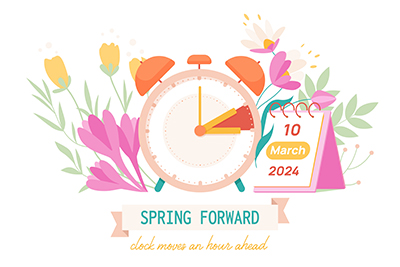This Sunday, March 10, at 2 a.m., all our smart devices — our mobile phones, smart watches, tablets, computers and Alexa-enabled assistants — will spring forward to 3 a.m. for Daylight Saving Time (DST). And with DST comes some pros, some cons and some things employers should consider when it comes to their employees.
Let’s start with what employers should keep in mind: DST may cause potential complications for employers’ timekeeping practices. Since DST starts Sunday at 2 a.m. local time, 2 a.m. instantly becomes 3 a.m. — meaning graveyard shift employees may only work and need to be paid for a seven-hour shift that night. Employers with employees working overnight should review timekeeping practices to make sure all employees are accurately paid for all hours worked.
Although it may complicate some employers’ timekeeping, DST has several potential benefits — one is it reduces crime. Plus, increased sunlight for the human body has several benefits. Over the years, DST’s touted benefit of reduced traffic collisions has been studied with varying outcomes: One study says springing forward increases fatal traffic accident risk while a different study found a reduction over time.
Although often touted as a pro, the electricity savings benefit has essentially been debunked by multiple studies, including a Yale study that found DST increases electricity demand contrary to the policy’s intent, citing “a trade-off between reducing demand for lighting and increasing demand for heating and cooling.” And a California Energy Commission study found that DST “had little or no effect on energy consumption in California.”
But the negative consequences of seasonal time changes on human beings are many, according to Johns Hopkins Bloomberg School of Public Health. They include:
- Acute increases in adverse health consequences, including heart attacks and strokes.
- A heightened risk of mood disturbances and hospital admissions.
- Elevated production of inflammatory markers in response to stress.
- Going to sleep and waking up before our internal clocks are ready for us to, causing a misalignment that lasts for DST’s duration, ultimately reducing the amount of sleep we’re able to get. This results in:
- Decreases in cardiovascular health;
- Increases in diabetes and obesity;
- Poorer mental health; and
- Lower cognitive performance.
After the time change, most people lose up to 40 minutes of sleep, which may not seem like much, according to Entrepreneur — but it’s enough to cause fatigue and daytime sleepiness, and impact employees’ work performance, concentration and memory.
In addition, overly sleepy employees are 70 percent more likely to be involved in workplace accidents than colleagues who are not sleep deprived, according to the Sleep Foundation. On average, 3.6 more injuries occurred on the Mondays following the switch to DST compared to other days, and 2,649 more days of work were lost as a result of those injuries — a 68 percent increase in lost work days.
Whether you’re pro- or anti-DST doesn’t necessarily matter because the time to spring forward is here — so remember to manually change those analog devices, too!
Jessica Mulholland, Managing Editor, CalChamber
CalChamber members can read more about Timekeeping and Recording Guidelines, including accurately recording time, in the HR Library. Learn how to power your business with a CalChamber membership.
